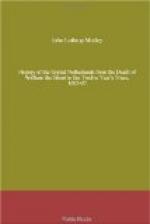John Neyen soon returned to the Hague, having persuaded his masters that it was best to affect compliance with the preliminary demand of the States. During the discussions in regard to peace, it would not be dangerous to treat with the rebel provinces as with free states, over which the archdukes pretended to no authority, because—so it was secretly argued—this was to be understood with a sense of similitude. “We will negotiate with them as if they were free,” said the greyfriar to the archduke and his counsellors, “but not with the signification of true and legitimate liberty. They have laid down in their formula that we are to pretend to no authority over them. Very well. For the time being we will pretend that we do not pretend to any such authority. To negotiate with them as if they were free will not make them free. It is no recognition by us that they are free. Their liberty could never be acquired by their rebellion. This is so manifest that neither the king nor the archdukes can lose any of their rights over the United Provinces, even should they make this declaration.”
Thus the hair-sputters at Brussels—spinning a web that should be stout enough to entrap the noisy, blundering republicans at the Hague, yet so delicate as to go through the finest dialectical needle. Time was to show whether subtilty or bluntness was the best diplomatic material.
The monk brought with him three separate instruments or powers, to be used according to his discretion. Admitted to the assembly of the States-General, he produced number one.
It was instantly rejected. He then offered number two, with the same result. He now declared himself offended, not on his own account, but for the sake of his masters, and asked leave to retire from the assembly, leaving with them the papers which had been so benignantly drawn up, and which deserved to be more carefully studied.
The States, on their parts, were sincerely and vehemently indignant. What did all this mean, it was demanded, this producing one set of propositions after another? Why did the archdukes not declare their intentions openly and at once? Let the States depart each to the several provinces, and let John Neyen be instantly sent out of the country. Was it thought to bait a trap for the ingenuous Netherlanders, and catch them little by little, like so many wild animals? This was not the way the States dealt with the archdukes. What they meant they put in front— first, last, and always. Now and in the future they said and they would say exactly what they wished, candidly and seriously. Those who pursued another course would never come into negotiation with them.
The monk felt that he had excited a wrath which it would be difficult to assuage. He already perceived the difference between a real and an affected indignation, and tried to devise some soothing remedy. Early next morning he sent a petition in writing to the States for leave to make an explanation to the assembly. Barneveld and Recorder Aerssens, in consequence, came to him immediately, and heaped invectives upon his head for his duplicity.




